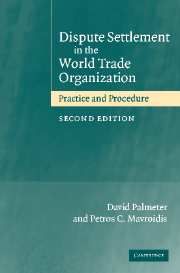6 - The Appellate Process
Published online by Cambridge University Press: 05 March 2012
Summary
Overview
The WTO Appellate Body consists of seven Members, three of whom serve on any particular case. Its jurisdiction is limited to issues of law covered in a panel report and to legal interpretations developed by a panel. The Appellate Body may uphold, modify or reverse the legal findings and conclusions of a panel. However, if it modifies or reverses the findings, it may not remand the matter to the panel for further proceedings. The Appellate Body's proceedings are confidential. As is the case with panels, ex parte communications with the Appellate Body concerning matters under its consideration are not permitted.
The task of the Appellate Body
In its Report in US – Certain EC Products, the Appellate Body reflected on its task:
[W]e observe that it is certainly not the task of either panels or the Appellate Body to amend the DSU or to adopt interpretations within the meaning of Art. IX:2 of the WTO Agreement. Only WTO Members have the authority to amend the DSU or to adopt such interpretations. Pursuant to Article 3.2 of the DSU, the task of panels and the Appellate Body in the dispute settlement system of the WTO is ‘to preserve the rights and obligations of Members under the covered agreements, and to clarify the existing provisions of those agreements in accordance with customary rules of interpretation of public international law’. (emphasis added) Determining what the rules and procedures of the DSU ought to be is not our responsibility nor the responsibility of panels; it is clearly the responsibility solely of the Members of the WTO.
- Type
- Chapter
- Information
- Dispute Settlement in the World Trade OrganizationPractice and Procedure, pp. 210 - 233Publisher: Cambridge University PressPrint publication year: 2004



